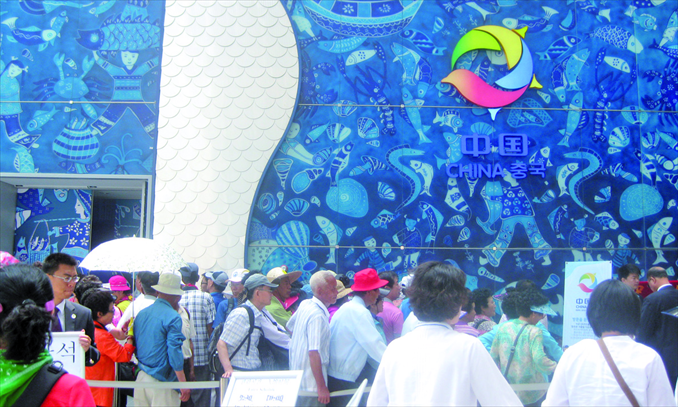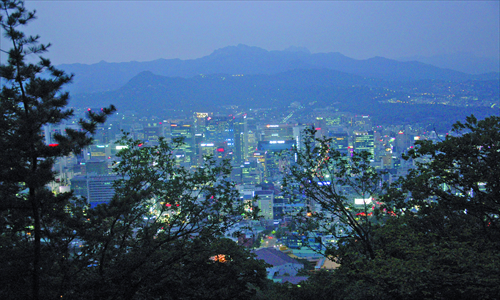Shrimp between whales

On an early June morning, a long queue of visitors are waiting to get into the China Pavilion at the 2012 Yeosu Expo, on the southern tip of the Korean Peninsula.
"The China Pavilion is one of the most popular places at the Expo. People have to wait outside for several hours to get into our pavilion," Zhao Zhen'ge, director of the China Pavilion, told the Global Times among crowds of visitors. Since the official opening on May 12, the China Pavilion has been receiving around 4,000 visitors daily, and 7,800 on peak days.
But these thousands are a drop in the bucket compared to Korean tourism in China, now the country's biggest tourist destination. In 2010-11, more than 12 million South Korean tourists visited China.
Since China and South Korea formally established diplomatic relations in 1992, the two countries' relations have grown closer in many ways. South Korean President Lee Myung-bak sealed a strategic partnership with China soon after he came into power in February 2008.
Thanks to the phenomenal bilateral trade of nearly $250 billion in 2011, China has become South Korea's biggest trade partner and export destination. In April, South Korea's Samsung Electronics announced it would invest $7 billion in a flash chip plant in Xi'an, capital of Shaanxi Province. "This is the largest overseas investment project by Samsung so far, and our economic cooperation with China will only increase in the years to come," said Cho Won-myung, the counselor of the Embassy of the Republic of Korea.
Currently, there are more than 68,000 Korean students studying in China, and 79,000 Chinese students in South Korea.
"Given so much things have happened in such a short period of only two decades, we have to say, the bilateral ties between South Korea and China are like a miracle," Ma Jisheng, deputy director-general of the Information Department of the Chinese Ministry of Foreign Affairs, told reporters on June 8.

Shifting views
In South Korea, Chinese tourists are ubiquitous, whether in the mountains of Jeju Island or Seoul's downtown shopping centers.
Most Koreans' views of China have radically changed in the last 20 years. Kim Jae-hyun, an overseas student in Shanghai from South Korea, says the Korean people's lives today is no big difference with Chinese.
"When I first came to China back in 1998, Chinese were still economically backward, but today, the huge income gap between Chinese and South Koreans has largely narrowed," said Kim, the author of a book about his time in China called China, Can I say NO to You? South Korean per capita income, at roughly $22,728, is still considerably higher than the Chinese average of $5,414, according to IMF figures in 2011.
But uncertainties remain about China's rise. South Korea was a vassal state of China's for 400 years prior to the Japanese invasion, and mixed feelings about Chinese power remain. Many Korean scholars, while recognizing that China is the biggest opportunity for Korea's development, also warn about possible threats from its rising power, according to a survey on 15 Korea-China experts by the Dong-A Ilbo in early June.
"We pay great attention to China's development, as well as to how a rising China will have its impact on Northeast Asia, including Korea. So it's understandable that we would be kind of sensitive toward every move from China," said Sunny Lee, the China correspondent with the Korea Times during a video interview with FT China early this year.
Online wars
Despite the close cooperation between the two neighbors at the State level, Kim Jae-hyun describes his mixed reception in modern China.
"In the late 1990s, everyone in China was very hospitable and friendly to me, but today, it's so disturbing to see that quite a few Chinese have taken a dislike to South Korea. Sometimes, we have become a laughing stock for many Chinese Web users," said Kim.
"The national feelings of South Korea toward a rapidly rising China are now at a kind of critical and special stage," said an official surnamed Chen with the Chinese embassy to Seoul.
Aside from the long-standing complaints from South Koreans about China's support for North Korea, the historical and cultural issues around the two countries have often led to flame wars online. Since 2005, Chinese nationalists have whined online about South Korea's successful application for UNESCO intangible cultural heritage status for the Gangneung Danoje festival, a local festival derived from China's Dragon Boat Festival, which is celebrated on the fifth day of the fifth lunar month.
They also accuse South Koreans of appropriating Chinese culture, such as claiming that they invented Chinese characters. There is a long-standing dispute over which "side" invented the typography. Being "ignorant and conceited" has become a stereotyped image of Koreans for many Chinese Web users.
In return, Korean media, academics and netizens have called Chinese people "arrogant" and complained about a recent announcement by the State Administration of Cultural Heritage in China about the supposed length of the Great Wall. The South Korean media, by quoting Korean experts, expressed their discontent about China's attempts to extend the concept of the Great Wall to Heilongjiang and Jilin provinces, which they argue was historically Korean territory.
"They have a history as a weak nation that had been bullied by other big powers and had a strong reliance on Chinese culture. But Koreans soon got a strong sense of national pride after their economic liftoff, yet since they are still insecure, they have become very sensitive towards anything that might shake their current situation," said Professor Cai Jian with the Center for Korean Studies of Fudan University.

In a survey on 12,000 Chinese by the International Herald Leader under the Xinhua News Agency in 2007, South Korea was the most disliked neighboring country at 40.1 percent of the vote, 10 percent higher than Japan.
In both Kim and Lee's views, the current outstanding disputes between the two countries are largely due to a serious lack of comprehensive and effective communication between both sides, which has led to misunderstandings.
"The Gangneung Danoje festival may have originated from China, but now it has been totally changed and localized with Korean characteristics that include religious activities, dancing and folk art, which has nothing to do with eating rice dumpling, dragon boat race or commemorating Qu Yuan, a famous poet from the Chu State of the Warring States period (475BC-221BC)," Kim defends.
Meanwhile, people from both sides say media from both countries also should take responsibilities for creating an objective image of both countries, as too much focusing on the controversial or negative elements to attract readers' attention could only deepen misunderstandings.
Kim Hyun-ho, the executive director of the Korea Press Foundation, asks for a cautious view on media reports from both sides. "A very few people's attitudes, or some unfortunate incidents, were exaggerated by the media, which had a negative impact on the bilateral ties," said Kim.
Challenges linger
Since 2010, national feelings on both sides have been hurt again. China is one of very few countries that refused to assign blame in the sinking of the South Korean warship Cheonan to North Korea. There have also been continual clashes between Chinese fisherman and Korean maritime patrols.
"There is still a lack of mutual trust between the people of both countries, and we have yet to realize a high-toned strategic partnership with South Korea," said Professor Cui Zhiying, a Korean expert from Shanghai Tongji University.
In the face of instability on the Korean Peninsula, the South Korea-US alliance and the unsolved fishing issues between the two countries, experts expect the frictions in politics, trade and even cultural values between the two countries will continue to increase.
Kim compares China to a whale in the "pond of Asia," which would inevitably have its impact felt on the neighboring countries, Chinese experts call for a global perspective, rather than a sentimental nationalism, in dealing with South Korea from a grass-roots level.
"China, as a rising big power, should have a magnanimous manner and try to look at the China-South Korea bilateral relations from a far-reaching perspective, so as to further promote the friendship between the two countries," said Cui.
Optimistic future
In today's South Korea, the US influence on South Korea is still much deeper than China's. Koreans begin English classes in their first year of primary school, and the US is the first pick for overseas studies.
At an ongoing public photo exhibition featuring today's Korea, a photo of South Korea President Lee Myung-bak shaking hands with US President Barack Obama at the G20 summit in Seoul stands out.
But many Koreans also see cooperating with a rising China as important.
South Korean Foreign Ministry spokesperson Cho Byung-jae is very optimistic about South Korea-China ties. "Both South Korea and China share responsibilities for the peace and prosperity of Northeast Asia, and I am sure the frequent exchanges between the two countries will make it possible for us to solve all of the issues through peaceful dialogue and negotiations," said the spokesman.
"I just want to use my book to create a new angle for my Chinese friends to look at the issues, and most importantly, to clean up misunderstandings, I am sure the voices seeking for a win-win development with China will get more and more support from inside Korea," said Kim.